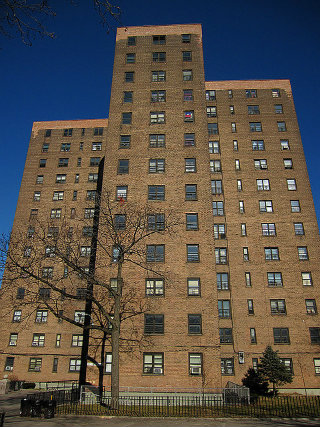
Parking minimums apply to New York’s public housing, but most spots are rented by nonresidents, leaving the 160,000 New Yorkers in line for housing out in the cold. De Blasio is set to change that. From H.L.I.T.
An argument that public officials and housing advocates in New York City have long made—that parking mandates contribute to the high costs of new housing there—may soon be validated by Mayor Bill de Blasio’s new affordable housing plan. Due May 1, the plan will be produced by the mayor’s housing team, which includes Vicki Been, commissioner of the city’s Department of Housing Preservation and Development and author of a 2012 study of New York’s regressive parking regulations.
The study reinforced past reports showing that the city’s parking minimums were forcing developers to build unnecessary infrastructure for cars, which caused less development, increased traffic, and fueled higher housing costs. “Our findings suggest that the requirements generally cause developers to provide more off-street parking than they think buyers and tenants really demand,” Been said at the time.
The Department of City Planning has since developing zoning reforms for the Manhattan core and downtown Brooklyn that eliminate parking requirements for affordable housing, recognizing that low-income households have low rates of car ownership. It has made similar recommendations for an inner ring of neighborhoods in Manhattan, Brooklyn, Queens, and the Bronx, including such communities as Brownsville, Astoria, and East Harlem.
Supporters of affordable housing praised the move, but some pushed for stricter regulations, such as a guarantee that the lower parking requirements will lead to the construction of more affordable units. “If we’re going to change the parking rules to make it easier to build, that should be explicitly tied to the creation of affordable housing,” said Moses Gate of the Association for Neighborhood Housing and Development (ANHD), a coalition of nonprofit housing advocates and developers.
The mayor’s campaign bluster last year would seem to have supported Gate’s stance. At the time, de Blasio pledged to implement mandatory inclusionary zoning, which would require developers to include affordable units in their market-rate projects and likely mean increasing the projects’ allowed density or reducing their development costs.
The city hasn’t yet indicated that wider parking reforms will be part of its affordable housing plan, however. In March, the New York Post reported that the city was exploring inclusionary zoning, higher taxes on vacant land, and revising the permitting process, among other possible strategies. Changes to its parking policies were not acknowledged.
Even the ANHD hasn’t tracked the potential impact of parking reforms on affordable housing, despite the fact that structured parking in New York City can run up to $50,000 per spot. “Adjusting the parking standards is something that hasn’t been at the forefront of our minds,” he told Streetsblog recently. “It hasn’t been an explicit campaign. We should take a look at it.”